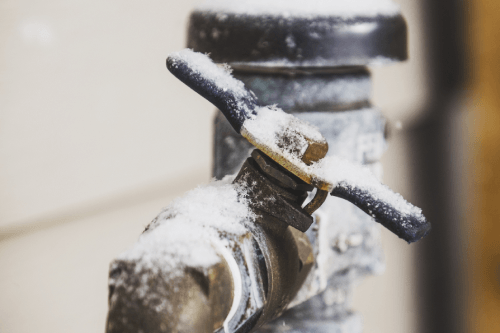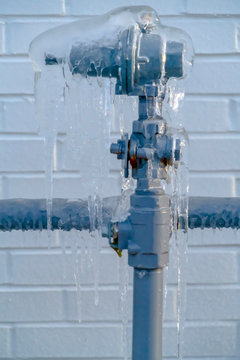Crucial Advice to Avoid Frozen Pipes in Winter
Crucial Advice to Avoid Frozen Pipes in Winter
Blog Article
Nearly everybody seems to have their private rationale in relation to Preventing and dealing with frozen pipes.

Cold weather can wreak havoc on your plumbing, particularly by freezing pipes. Here's how to prevent it from happening and what to do if it does.
Introduction
As temperatures drop, the threat of icy pipes increases, potentially leading to pricey repair services and water damage. Understanding just how to avoid frozen pipelines is vital for house owners in cold climates.
Understanding Frozen Pipes
What triggers pipelines to ice up?
Pipelines freeze when revealed to temperature levels listed below 32 ° F (0 ° C) for extended durations. As water inside the pipelines ices up, it increases, putting pressure on the pipe wall surfaces and possibly creating them to break.
Threats and problems
Icy pipelines can result in supply of water interruptions, property damages, and pricey fixings. Ruptured pipes can flood homes and cause considerable architectural damage.
Signs of Frozen Pipes
Recognizing frozen pipes early can stop them from rupturing.
How to recognize frozen pipelines
Try to find decreased water circulation from taps, unusual smells or noises from pipelines, and visible frost on subjected pipelines.
Prevention Tips
Protecting at risk pipelines
Wrap pipes in insulation sleeves or use warm tape to secure them from freezing temperature levels. Concentrate on pipelines in unheated or external locations of the home.
Home heating techniques
Keep indoor rooms effectively warmed, particularly locations with pipes. Open up cabinet doors to allow cozy air to distribute around pipelines under sinks.
Securing Outdoor Pipes
Yard hoses and outside taps
Separate and drain yard tubes prior to wintertime. Set up frost-proof spigots or cover outside faucets with shielded caps.
What to Do If Your Pipelines Freeze
Immediate actions to take
If you think frozen pipelines, maintain taps available to relieve pressure as the ice thaws. Utilize a hairdryer or towels soaked in warm water to thaw pipes gradually.
Long-Term Solutions
Structural changes
Think about rerouting pipes far from exterior walls or unheated locations. Include extra insulation to attics, basements, and crawl spaces.
Upgrading insulation
Purchase top quality insulation for pipes, attics, and wall surfaces. Appropriate insulation aids maintain regular temperature levels and decreases the risk of frozen pipes.
Conclusion
Avoiding icy pipelines requires proactive steps and quick responses. By understanding the reasons, indicators, and safety nets, homeowners can protect their pipes during cold weather.
Helpful Tips to Prevent Frozen Pipes this Winter
UNDERSTANDING THE BASICS: WHY PIPES FREEZE AND WHY IT’S A PROBLEM
Water freezing inside pipes is common during the winter months, but understanding why pipes freeze, and the potential problems it can cause is crucial in preventing such incidents. This section will delve into the basics of why pipes freeze and the associated problems that may arise.
THE SCIENCE BEHIND FROZEN PIPES
When water reaches freezing temperatures, it undergoes a physical transformation and solidifies into ice. This expansion of water as it freezes is the primary reason pipes can burst. As the water inside the pipe freezes, it expands, creating immense pressure on the walls. If the pressure becomes too great, the pipe can crack or rupture, leading to leaks and water damage.
FACTORS THAT CONTRIBUTE TO PIPE FREEZING
Low Temperatures: Extremely cold weather, especially below freezing, increases the risk of pipes freezing. Uninsulated or Poorly Insulated Pipes: Pipes located in unheated areas, such as basements, crawl spaces, or attics, are more prone to freezing. Insufficient insulation or lack of insulation altogether exacerbates the problem. Exterior Wall Exposure: Pipes running along exterior walls are susceptible to freezing as they encounter colder temperatures outside. Lack of Heating or Temperature Regulation: Inadequate heating or inconsistent temperature control in your home can contribute to frozen pipes. PROBLEMS CAUSED BY FROZEN PIPES
- Pipe Bursting: As mentioned earlier, the expansion of water as it freezes can cause pipes to burst, resulting in significant water damage.
- Water Damage: When pipes burst, it can lead to flooding and water damage to your property, including walls, ceilings, flooring, and personal belongings.
- Structural Damage: Prolonged exposure to water from burst pipes can compromise the structural integrity of your home, leading to costly repairs.
- Mold and Mildew Growth: Excess moisture from water damage can create a favorable environment for mold and mildew growth, posing health risks to occupants.
- Disrupted Water Supply: Frozen pipes can also result in a complete or partial loss of water supply until the issue is resolved.
WHY CERTAIN PIPES ARE MORE PRONE TO FREEZING
- Location: Pipes located in unheated or poorly insulated areas, such as basements, crawl spaces, attics, or exterior walls, are at higher risk of freezing.
- Exterior Pipes: Outdoor pipes, such as those used for irrigation or exposed plumbing, are particularly vulnerable to freezing as they are directly exposed to the elements.
- Supply Lines: Pipes that carry water from the main water supply into your home, including the main water line, are critical to protect as freezing in these lines can affect your entire plumbing system.
- Underground Pipes: Pipes buried underground, such as those connected to sprinkler systems or outdoor faucets, can be susceptible to freezing if not properly insulated.
https://busybusy.com/blog/helpful-tips-to-prevent-frozen-pipes-this-winter/

I am just very involved in How To Avoid Freezing Pipes and I am assuming you enjoyed the entire page. Appreciated our blog? Please share it. Help someone else locate it. Thank you so much for your time spent reading it.
Information Here Report this page